One Woman's Journey With Advanced Breast Cancer

“I was so frightened when I was first diagnosed with advanced breast cancer, but it is important to have hope,” Vela said.
Breast cancer is considered advanced when the cancer has spread to other parts of the body, for example, to tissue near the breast (known as “locally advanced”) or to remote areas of the body, such as the brain, bones or liver (known as “metastatic”). Unlike some early-stage breast cancers, advanced breast cancer is not curable. Women with advanced breast cancer remain on treatment for the rest of their lives. In Michele's case, the cancer had spread to her bones.
After testing, Michele learned that she had advanced hormone receptor-positive (HR+)/HER2 negative breast cancer. Advanced HR+/HER2 negative breast cancer is the most common form of the disease and is fueled by hormones such as estrogen and progesterone.
With treatment, most recently including the common hormone therapy letrozole, Michele’s cancer was kept under control for several years. Recently, Michele received the news she feared: the cancer had spread again, this time to her ribs.
Michele worked closely with her doctor to learn about her options. Postmenopausal women with advanced HR+/HER2 negative breast cancer are often treated with hormone therapy, but resistance to hormone therapy can develop, causing tumors to grow and spread. After progressing on a treatment regimen including letrozole, Michele started a new treatment plan, which included Afinitor (everolimus tablets) and exemestane.
Afinitor targets a specific pathway that may help extend the benefit of hormone therapy. The FDA approved Afinitor in 2012 for postmenopausal women with advanced HR+/HER2 negative breast cancer in combination with exemestane (a commonly used option) after failure of treatment with letrozole or anastrozole, offering another option for patients.
“My diagnosis helped me realize how precious my life is and the people around me are,” Vela said. “But the most important thing I’ve learned throughout my journey with the disease is that we are the beneficiaries of 21st-century medicine, and there are a lot of treatment options out there.”
A clinical trial found that adding Afinitor to the drug exemestane more than doubled the time women lived without tumor growth, to a median of 7.8 months compared to treatment with exemestane alone at a median of 3.2 months. In this study, the most common adverse reactions (incidence ≥ 30 percent) associated with Afinitor were mouth sores, infections, rash, tiredness, diarrhea and decreased appetite. Afinitor can cause serious side effects, including lung or breathing problems, infections and kidney failure, which can sometimes be fatal. If patients experience these side effects, they may need to stop taking Afinitor for a while or use a lower dose.
Currently available data have not shown an increase in overall survival. Additional data will be available in the future.
Afinitor® (everolimus) Important Safety Information
Patients should not take Afinitor if they are allergic to Afinitor or to any of its ingredients. Before taking Afinitor, patients should tell their healthcare provider if they are allergic to sirolimus (Rapamune®) or temsirolimus (Torisel®).
Afinitor can cause serious side effects, including lung or breathing problems, infections, and kidney failure, which can even be fatal. If patients experience these side effects, they may need to stop taking Afinitor for a while or use a lower dose. Patients should follow their healthcare provider's instructions.
In some patients, lung or breathing problems may be severe and can even be fatal. Patients should tell their healthcare provider right away if they have any of these symptoms: new or worsening cough, shortness of breath, chest pain, difficulty breathing or wheezing.
Afinitor may make patients more likely to develop an infection, such as pneumonia, or a bacterial, fungal or viral infection. Viral infections may include reactivation of hepatitis B in people who have had hepatitis B in the past. In some people, these infections may be severe and can even be fatal. Patients may need to be treated as soon as possible. Patients should tell their healthcare provider right away if they have a temperature of 100.5°F or above or chills, or do not feel well. Symptoms of hepatitis B or infection may include the following: fever, chills, skin rash, joint pain and inflammation, tiredness, loss of appetite, nausea, pale stools or dark urine, yellowing of the skin or pain in the upper right side of the stomach.
Afinitor may cause kidney failure. In some people, this may be severe and can even be fatal. Patients should have tests to check their kidney function before and during their treatment with Afinitor.
Common side effects include mouth ulcers. Afinitor can cause mouth ulcers and sores. Other common side effects include infections; feeling weak or tired; nausea and vomiting; skin problems; headache; weight loss; loss of appetite; cough; diarrhea; fever; swelling of the hands, arms, legs, feet, face or other parts of the body; joint pain, abnormal taste; stomach-area (abdomen) pain, nose bleeds, seizures, increased blood cholesterol and sugar levels, decreased blood phosphate levels, low red and white blood cells and the absence of menstrual periods (menstruation).
Please see full Prescribing Information for Afinitor available at Afinitor.com.
Rapamune® (sirolimus) and Torisel® (temsirolimus) are registered trademarks of Wyeth Pharmaceuticals Inc.
For more information, talk to your doctor and visit www.Afinitor.com..
AFB-1073449 10/2013

No comments: